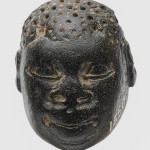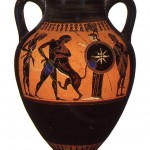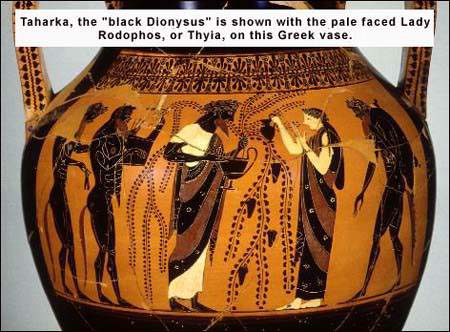
By Jide Uwechia with cited sources
The Benin Haplogroup or Haplogroup 19 Common in Africans, southern Greeks, Sicilians, and Albanians
There are at least four distinct African, (known as Senegal, Congo, Benin, Bantu Hbs Haplogroups) and one Asian chromosomal backgrounds (haplotypes) on which the sickle cell mutation has arisen.
The Benin haplotype (which originates from Nigeria, West Africa) accounts for HbS associated chromosomes in Sicily Northern Greece, Southern Turkey, and South West Saudi Arabia, suggesting that these genes had their origin in West Africa. The Asian haplotype is rarely encountered outside its geographic origin because there have been few large population movements and Indian emigrants have been predominantly from non HbS containing populations. Per:Graham R. Serjeant, MD, FRCP, The Geography Of Sickle Cell Disease:Opportunities For Understanding Its DiversityRSITY: http://www.kfshrc.edu.sa/annals/143/rev9239.html
Nigeria, west Africa appears the most logical origin of the sickle mutation in Greece evidence from beta S globin gene cluster polymorphisms (1991). It has been conclusively demonstrated that HbS in Greece is mostly haplotype #19 (the one that originated in Benin, Nigeria West Africa). See, Boussiou M, Loukopoulos D, Christakis J, Fessas P.; The origin of the sickle mutation in Greece; evidence from beta S globin gene cluster polymorphisms. Unit for Prenatal Diagnosis, Laikon Hospital, Athens, Greece.
Additionally, previous data suggest that the S/Bantu haplotype (from Southern Africa) is heterogeneous at the molecular level. Recent studies also report a similar heterogenity for the Benin Haplogroup. A study demonstrated the presence of the A -499 TA variation in sickle cell anemia chromosomes of Sicilian and North African origin bearing the S/Benin haplotype (from Nigeria). Being absent from North American S/Benin chromosomes, which were studied previously, this variation is indicative for the molecular heterogeneity of the S/Benin haplotype. Am. J. Hematol. 80:79-80, 2005.
A study was done in Albania (which borders Greece) relating to sickle cell anemia, sickle cell beta-thalassemia, and thalassemia major in Albania. The focus of the study was the characterization of sickle cell mutations. As one would expect, it was shown that the HbS mutation in the Albanian sample is the Benin (Nigeria)-originating haplotype #19. See, Boletini E, Svobodova M, Divoky V, Baysal E, Dimovski AJ, Liang R, Adekile AD, Huisman TH.; Sickle cell anemia, sickle cell beta-thalassemia, and thalassemia major in Albania: characterization of mutations. : Hum Genet. 1994 Feb;93(2):182-7.
According to a study done in 1973, before the availability of the advanced data cited above, “the occurrence of the sickle-cell trait in southern Europe …. is believed to reflect gene flow from the Middle East.” See A. P. GELPI, M.D, “Migrant Populations and the Diffusion of the Sickle-Cell Gene” August 1, 1973 vol. 79 no. 2 258-264 http://www.annals.org/content/79/2/258.abstract.
The problem with this 1973 study is that it assumes that the sickle cell genes came with the Arabs. Alas, updated research work has proven beyond doubt that the sickle cell genes proven to exist in southern Europe are exclusively Sickle cell gene Haplotype 19 or the Benin Sickle cell gene from Nigeria.
Y Haplogroup E-M78 and YAP In Black Africans and Greeks
Y Haplogroup E-M78 a derivative of E3B is a signature African gene as confirmed in research studies over the last few years. The high frequency of this haplogroup in Greece suggests the presence of a substantive African population in that region during prehistoric and historical time periods.
A recent paper has detected clades of haplogroups J and E3b that were likely not part of pre-historic migrations into Europe, but rather spread by later historical movements. Greeks .. [then there is] the marker J-M267, which may reflect more recent Middle Eastern admixture.
(Semino et al., Am J Hum Genet, 2004) E3b originates from East Africa while there is a high frequency of J-M267 in the East Coast of Africa as well as the Red sea coast of Arabia.
A recent sampling of the Greek population comprised 36 Peloponnesian samples, 5 of which were J-M172(xM12) and 17 of which were E-M78 (R.K., unpublished data).
In spite of the small Peloponnesian sample size, the high E-M78 frequency (47%) observed here is consistent with that (44%) independently found in the same region (Di Giacomo et al. 2003) for the YAP chromosomes harboring microsatellite haplotypes A. (Novelletto, personal communication) (Cruciani et al. 2004).
The study by by Di Giacomo et al. found the following African haplogroups in Greeks: Haplogroup A which is highly specific to West Africa, R1a, DE, and J2*(xDYS413= 18)J*(xJ2). R1* which probably gave rise to R1a is found in Northern Cameroon. DE is found principally among Nigerians and it is suspected that it originated from Nigeria. J is very prominent in East, and North Africa.
High-resolution Y-chromosome haplotyping and particular microsatellite associations reveal … an East Africa homeland for E-M78.Origin. See Ornella Semino, Chiara Magri, et al “Diffusion, and Differentiation of Y-Chromosome Haplogroups E and J: Inferences on the Neolithization of Europe and Later Migratory Events in the Mediterranean Area” http://www.pubmedcentral.nih.gov/articlerender.fcgi?tool=pubmed&pubmedid=15069642
HLA Genetic Relationship Between Ancient Greeks and Black Africans
HLA genes are reliable markers of past population movement and are still used in laboratories today to establish genetic inter-relationship amongst seemingly diverse peoples.
HLA genes in Macedonians and the sub-Saharan origin of the Greeks (2001) was a study conducted by Dr. Arniaz and other scholars in a top flying Spanish University. This study uses HLA genes to establish the African dimension of the roots of ancient Greece.
According to the Arniaz study, …Greeks are found to have a substantial relatedness to sub-Saharan (Ethiopian) people, which separate them from other Mediterranean groups. Both Greeks and Ethiopians share quasi-specific DRB1 alleles, such as *0305, *0307, *0411, *0413, *0416, *0417, *0420, *1110, *1112, *1304 and *1310. Genetic distances are closer between Greeks and Ethiopian/sub-Saharan groups than to any other Mediterranean group and finally Greeks cluster with Ethiopians/sub-Saharans in both neighbour joining dendrograms and correspondence analyses. The time period when these relationships might have occurred was ancient but uncertain and might be related to the displacement of Egyptian-Ethiopian people living in pharaonic Egypt. See Arnaiz-Villena A, et.al: HLA genes in Macedonians and the sub-Saharan origin of the Greeks. Tissue Antigens. 2001 Feb; 57(2): 118-27
There is a fraudulent claim (by those with idealogical investments in the topic) on the Internet that this study has been “retracted” or “refuted.” The study is perfectly valid. Sub-Saharan-specific and quasi-sub-Saharan-specific alleles were definitely detected in the Greek population at the DRB1 locus, and this is not open to question.
It would be helpful here to discuss the study that was retracted, and the reason why. It is the work titled: “The origin of Palestinians and their genetic relatedness with other Mediterranean populations” (which contained some cross-referenced Greek data in a neighbor-joining dendogram and a correspondence analysis) that was retracted. And it was retracted solely and strictly for political reasons, as this Observer article makes crystal clear:
http://www.guardian.co.uk/Archive/Article/0,4273,4307083,00.html
(Keep in mind we are dealing with the study on the relatedness of Jews and Palestinians at the moment, which was retracted, and not the one on the Greek-Black African relatedness, which was not retracted and remains valid. The two must not be confused.)
Appreciations to: http://onedroprule.org/about1071.html
Epilogue:
“Hb S is common in some areas of the Mediterranean basin, including regions of Italy, Greece, Albania and Turkey (Boletini et al., 1994) (Schiliro et al., 1990). Haplotype analysis shows that the Hb S in these areas originated in Africa. The genes probably moved along ancient trading routes between wealthy kingdoms in western Africa and the trade centers in the Mediterranean basin.” (Harvard University, http://sickle.bwh.harvard.edu/scdmanage.html)
“Usually, people with sickle cell disease outside Africa (e.g., blacks in the United States) or India have mixed haplotypes for their sickle cell genes.” (Harvard University, http://sickle.bwh.harvard.edu/scdmanage.html)
“Templeton gives a modern-day analogy: the presence of a gene for sickle cell anemia in Caucasians in Portugal. The gene traces back to a mutation that occurred in Africa and spread through interbreeding between Africans and Europeans. “The Africans didn’t come up, reconquer the Iberian peninsula, kill off all the Europeans, and that’s why there are sickle cell alleles in Portugal today,” he says. The presence of the sickle cell gene in Portugal “means that Portuguese and Africans have met and they’ve interbred, just like humans tend to do.” – “Out of Africa” – Ruth Flanagan, Contributing Editor, Earth Magazine, http://www2.mc.maricopa.edu/anthro/l…ofAfrica5.html




More Lessons on Genetic Science for Orphesus:
A study by Di Giacomo et al. in 2003 found the following African haplogroups in Greeks: Haplogroup A which is highly specific to West Africa, R1a, DE, and J2*(xDYS413= 18)J*(xJ2). R1* which probably gave rise to R1a is found in Northern Cameroon. DE is found principally among Nigerians and it is suspected that it originated from Nigeria. J is very prominent in East, and North Africa.
“…DE molecular ancestors first evolved inside Africa and subsequently contributed as Y chromosome founders to pioneering migrations….†See Peter A. Underhill , Toomas Kivisild, “Use of Y Chromosome and Mitochondrial DNA Population Structure in Tracing Human Migrations,†Annual Review of Genetics, Vol. 41: 539-564 (Volume publication date December 2007)
According to Weal et al.: “…Of the five DE* individuals, three had a microsatellite haplotype consisting of repeat sizes 13-13-22-11-11-13 (loci arranged in same order as listed above) while the other two had a haplotype differing by one step at DYS391 only (13-13-22-10-11-13). This high level of similarity in such a rapidly evolving system strongly suggests that these five individuals share a private common ancestor (as in Fig 2C, Fig D, or e). We note that of the three possible branching patterns, two (Fig 2C and Fig D) would imply an African origin for YAP…”
“Here we report a new very rare deep-rooting haplogroup within the YAP clade, together with data on other deep-rooting YAP clades (Fig 1). The new haplogroup, so far found only in five Nigerians, is the least derived of all YAP chromosomes according to currently known binary markers, such that application of the same phylogeographic inference method used by Hammer and colleagues (the nested cladistic method of TEMPLETON et al. 1995 Down) leads to the opposite conclusion—i.e., significant evidence for range expansion from West Africa to Asia…” (Jahdey”s comments: and Greece too where DE has been identified) See Michael E. Weale et al in “Rare Deep-Rooting Y Chromosome lineages in Humans: Lessons for Phylogeography, genetics 165: 229-234
Jahdey continues trashing Orphesus:
Orphesus chats about 1250 Nigerians and 5 Nigerians. Well, if you bothered to have looked closer you would have noticed that DE* is a rare deep-rooting Y chromosome. Orphesus the title of Michael Weals’ paper reads : “Rare Deep-Rooting Y Chromosome lineages in Humans:”
Thus so far so good, this rare haplogroup DE* which is the obvious genetic ancestor of the DE found in Greeks has been identified in Nigerians (the five tested in that study) out of the entire globe.
In any event, I would advise you to go pay for Underhill’s paper which is available online (the one you claim not to have accessed) to broaden your understanding of genetic science. It cost only $18. Do that instead of playing the pathetically ignorant troll.
Point made.
Greeks carry so many recent African genetic haplogroups that this issue has become trite and moot.
Even Orphesus has grudgingly admitted this.
Again I urge you Orphesus:
Just cite one, one peer reviewed paper that disproves the thesis of the article “The Nigerian origins of ancient Greeks”:
(a)that ancient Greeks have HBS genes from Nigeria; Haplogroup 19.
(b)that ancient Greeks also carry genetic material originating from Ethiopia;
(c)that haplogroup A, and E-M78, are absent on the Agean Islands and as such in Greeks.
If you are unable to cite one scientific paper to counter my arguments or to support your own, then you remain the illiterate that you will always be.
Jahdey
To all,
I am a Greek-American living in the United States (family originally from central Greece). Like many Greeks, I carry the Sickle Cell trait and find much of what is written on this blog to be very interesting; especially the segment that concludes that most Greeks share a common origin in West Africa (Nigeria, Ethiopia, etc).
To be honest, I’m totally okay with this conclusion as I am very proud of my Greek heritage and equally excited about knowing the origins of my people.
Best regards
Sorry but most Greek don’t share any common origins with Africans, especially those of WEST Africa. Its so sad to see people of black African origins try to distort history and the truth to fit an ideology that is false by trying to claim a Caucasian white European history and people like the Greeks.
Deva
The saddest aspect of all your trolling is that you are neither Greek nor African. You are a pink white bwoy apeing as a doorkeeper for the false HIS-storical status quo.
And all you have to say is no, noo, noooo! Because you are stricken with fear and angst at the collapse of all the lies and corruption that your mother fed you as an infant seeking the milk of knowledge.
Open up your ignorant mind and be liberated.
Jahdey
Dont try to convince Jahdey of listening to your voice. The person obviously has an inferiority complex and tries to associate any worldwide acocmplishments by different people to the black Africans. Its called “stealing other people’s glory”, or “plagiarizing other people’s achievements”. This is what these articles are doing. They are robbing other civilizations from their accomplishments due to the black inferiority complex observed by those like Jahdey. Its so sad to see this.
Muha-madder
But what about your Jecanite ancestors, you still have not confessed about their wretchedness.
Tell me oh lover of camels, where did your ancestors come from?
Jahdey
“Mohammad replied:
Dont try to convince Jahdey of listening to your voice. The person obviously has an inferiority complex and tries to associate any worldwide acocmplishments by different people to the black Africans. Its called “stealing other people’s gloryâ€, or “plagiarizing other people’s achievementsâ€. This is what these articles are doing. They are robbing other civilizations from their accomplishments due to the black inferiority complex observed by those like Jahdey. Its so sad to see this.”
You are so correct, Mohammad, its quite comical seeing people like him believing in all the nonsense he keeps writing about. Trying to turn every single ancient civilization into ‘black African’ is quite patheic really. LoL!